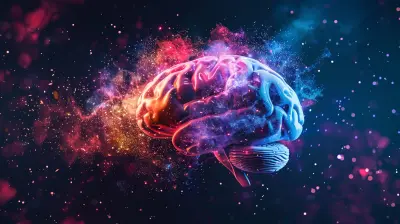The Link Between Nutrition and Cognitive Development in Children
25 August 2025
Let’s be real—when we think about raising kids, we often picture teaching them how to read, tying shoelaces, or maybe even helping with their science projects. But here's the deal: before they can ace a spelling bee or understand fractions, their brains need fuel. And not just any fuel—quality nutrition that powers up their mental development from day one.
We often hear the phrase, “You are what you eat,” and it turns out that’s more than just advice to avoid that third cookie. It's especially true for children. A child's brain grows at a lightning pace during their early years, and food plays a massive role in that process. So yeah, what kids eat could literally help shape how well they learn, think, remember, and focus.
Let’s break this down together. It’s time to talk food, brains, and everything in between.
Why Nutrition Matters More Than You Think (Especially for Kids)
Ever tried running a car with no gas? Or worse, putting soda in the fuel tank? That's basically what happens when kids don’t get the right nutrients—they’re trying to run a high-performance engine (aka their brain) without the right fuel.Children’s brains are growing faster than at any point in their lives. In fact, the most rapid brain development happens before age five. During this time, neurons are connecting, brain pathways are forming, and the foundations for everything from emotional intelligence to memory are being laid down.
So, what powers this incredible growth? You guessed it—nutrition. We're talking vitamins, minerals, proteins, healthy fats, and more.
The Brain-Nutrient Connection: What’s Going On Up There?
The brain might only weigh about 2% of the body, but it eats up over 20% of the body's energy. That’s wild, right? It’s like the brain is a tiny little powerhouse that’s always hungry.Let’s break down some of the major nutrients that support this powerhouse:
1. Omega-3 Fatty Acids: The Brain’s Best Friend
Think of omega-3s—especially DHA (docosahexaenoic acid)—as the building blocks of the brain. They make up the structure of cell membranes and are critical in brain development and functioning.You’ll find them in:
- Fatty fish like salmon and sardines
- Chia seeds
- Walnuts
- Flaxseeds
When kids get enough omega-3s, studies show they tend to perform better in areas like reading, memory, and behavior. Not bad for a few fish sticks, huh?
2. Iron: The Oxygen Carrier
Iron is like your brain’s delivery system. It helps carry oxygen to brain cells—vital for concentration and mental stamina. Low iron (a.k.a. iron deficiency anemia) is super common in kids and can mess with memory, attention span, and overall IQ.Iron-rich foods include:
- Lean meats
- Beans
- Spinach
- Fortified cereals
Pairing these with vitamin C-rich foods (like oranges) helps the body absorb iron more efficiently.
3. Protein: The Brain’s Construction Crew
Proteins are made of amino acids, and these are essentials for creating neurotransmitters—those little chemical messengers your brain uses to communicate.Best protein sources:
- Eggs
- Chicken
- Greek yogurt
- Cottage cheese
- Lentils and legumes
Protein helps with alertness, mood regulation, and overall cognitive performance. Basically, it keeps brain gears turning smoothly.
4. Zinc: The Learning and Memory Booster
Zinc doesn’t get the spotlight much, but it's a quiet hero when it comes to memory and thinking skills. Kids with low zinc levels can experience learning difficulties and poor attention.Zinc can be found in:
- Meat
- Dairy products
- Chickpeas
- Pumpkin seeds
The Role of Malnutrition: More Than Just Hunger
Let’s get something straight—malnutrition isn’t just about not eating enough. It’s also about not eating the right stuff.You can have a child eating plenty of calories and still be undernourished if those calories come from junk—think chips, sugary drinks, processed snacks. These foods offer little to no nutritional benefit and can actually interfere with brain development.
Malnutrition during critical growth periods can lead to:
- Lower IQ
- Slower language development
- Poor academic performance
- Behavioral issues
That’s a big price to pay for skipping a few balanced meals, right?
Sugar and the ADHD Connection—Myth or Truth?
Now we can't talk about nutrition without bringing up the sugar elephant in the room. There's been debate for years about whether sugar causes hyperactivity, especially in kids with ADHD. While the research is a bit mixed, here's what we do know:Excess sugar can mess with blood sugar levels, which in turn affects mood, energy, and focus. While sugar itself might not "cause" ADHD, it certainly doesn’t help things.
Plus, high sugar intake can displace healthy foods that would otherwise fuel cognitive development. So yeah, sugar might not be the villain, but it’s definitely not a hero either.
The Gut-Brain Axis: A Hidden Influence
Here's where things get even more interesting—the gut and the brain are actually besties. Scientists call it the “gut-brain axis.” The gut has millions of neurons and produces many of the same neurotransmitters as the brain, like serotonin and dopamine.When the gut is healthy, your kid’s more likely to be mentally sharp and emotionally stable.
Foods that support gut health:
- Yogurt and kefir (with probiotics)
- Fermented foods like sauerkraut and kimchi
- High-fiber fruits and veggies
So yes, that bowl of yogurt in the morning could be setting your child up for a better mood and stronger focus at school. Crazy, right?
Real Talk: The Struggle of Feeding Kids the “Right” Way
Look, I get it—feeding kids isn’t always easy. Some days you feel like a short-order cook, and other days it’s just chicken nuggets or bust. But even small improvements can make a big difference.Here are a few practical tips that have helped other parents (and myself):
- Make smoothies: You can sneak spinach, flaxseed, and even avocado into a fruit smoothie.
- Lead by example: If you’re munching on carrots, they’ll be more likely to give ‘em a try too.
- Keep healthy snacks visible: A bowl of fruit on the counter works wonders.
- Limit processed foods slowly: You don’t need to go cold turkey. Just swap one snack a day.
Remember, it's about progress, not perfection.
Nutritional Gaps Around the World
Depending on where a child lives, the nutritional challenges can vary greatly. In many lower-income countries, malnutrition due to lack of food is a major issue. Children often suffer from stunted growth, delayed development, and chronic illnesses.In contrast, kids in more developed countries might face a different battle—excess calories but low nutrients. That’s the fast-food, high-sugar, low-fiber syndrome.
Either way, the result is the same: compromised brain development and lower cognitive potential.
So this isn’t just a local parenting issue—it’s a global health challenge.
School Meals Matter More Than We Think
For a lot of children, especially in lower-income families, school meals might be their only reliable source of nutrition. That’s a huge responsibility for educational institutions.Quality school meals can:
- Improve attention and memory
- Lower dropout rates
- Boost test scores
- Decrease behavioral problems
Basically, a healthy school lunch is more powerful than we give it credit for. It's not just about calories—it’s about building brains.
Supplements: Are They Necessary?
This one’s tricky. Ideally, kids should get all their nutrients from whole foods. But let’s face it—not every child is munching on kale.In some cases, supplements might be necessary—especially for picky eaters, kids with allergies, or those with medical conditions. Always consult with a pediatrician before starting any vitamins or supplements.
Supplements worth considering include:
- Omega-3 fish oil
- Multivitamins for picky eaters
- Vitamin D (especially in winter months)
Just keep in mind, no pill can replace a plate of real food.
The Takeaway: Feeding the Mind One Bite at a Time
At the end of the day, what we put on our kids' plates has a real, lasting impact on their cognitive development. This isn’t about being perfect or making every single meal Instagram-worthy. It’s about making deliberate choices—one snack, one lunchbox, one dinner at a time.And remember, it’s never too late to start. Whether you’ve got a toddler, a grade-schooler, or a high schooler, nutrition can still play a powerful role in their mental well-being and academic performance.
So next time you hand your kid a meal, think of it as more than food—it’s brain fuel. And that, my friend, is the real magic on the menu.
all images in this post were generated using AI tools
Category:
Cognitive DevelopmentAuthor:

Eliana Burton
Discussion
rate this article
1 comments
Judith Luna
This article highlights the important connection between nutrition and cognitive development in children. By emphasizing balanced diets, it encourages parents and educators to prioritize healthy eating as a foundation for optimal learning and growth.
September 17, 2025 at 3:03 AM

Eliana Burton
Thank you for recognizing the vital link between nutrition and cognitive development! Prioritizing healthy eating is indeed essential for children's growth and learning.


